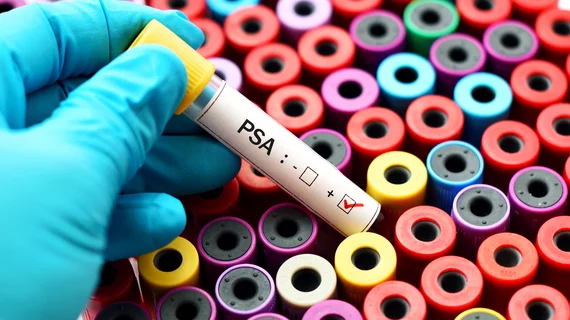Including advanced PET imaging into the treatment planning process for men with recurrent prostate cancer significantly improves health outcomes compared to using traditional imaging alone.
Deciding whether to offer post-prostatectomy radiation is difficult, because conventional imaging such as bone scans, CT, or MRI, doesn’t provide a full enough picture for treatment planning, researchers explained in The Lancet. Directing radiotherapy based on 18F-fluciclovine-PET/CT, however, allows clinicians to see increases in amino acid movement helpful in making this decision.
Patients who received this radiopharmaceutical had a cancer control rate of 75.5% at three and four years, compared to 63% at three years and 51% at four in the conventional imaging arms.
“This research has found that integrating advanced PET imaging using 18F-fluciclovine into the treatment planning process allows us to do a better job of selecting patients for radiation therapy, guiding radiation decisions and planning, and ultimately, keeping our patients’ cancer under control,” co-principal investigator Ashesh B. Jani, MD, of the Winship Cancer Institute at Emory University in Atlanta, said on Tuesday.
The single-center EMPIRE-1 study enrolled patients with prostate cancer who had prostate-specific antigen (PSA) detectable following prostatectomy and no findings on conventional imaging exams. The 165 participants were randomly assigned to receive radiotherapy guided only by conventional imaging or with the added help of 18F-fluciclovine-PET/CT.
Providers reported similar genitourinary or gastrointestinal side effects between both study groups, the authors noted. This is now the first randomized trial of its kind to show treatment based on imaging with the novel tracer can improve event-free survival rates.
“The EMPIRE-1 trial allowed us to determine whether using 18F-fluciclovine PET imaging influences patient outcomes for the better, and the significant results confirm that it does," David M. Schuster, MD, professor of radiology and imaging Sciences and director of the Division of Nuclear Medicine and Molecular Imaging at Emory University, said in a statement.
The amino acid-based radiopharmaceutical developed by Bracco subsidiary Blue Earth Diagnostics is currently approved by the U.S. Food & Drug Administration for PET imaging in men with suspected prostate cancer recurrence based on PSA levels.
You can read the full study published May 7 in The Lancet here.

